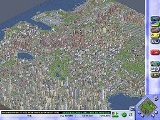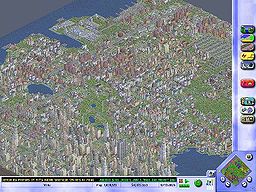
City-building game
Encyclopedia

City-building games are a genre of strategy computer game where players act as the overall planner and leader of a city, looking down on it from above, and being responsible for its growth and management. Players choose building placement and city management features such as salaries and work priorities, and the city develops accordingly.
City-building games such as SimCity
SimCity
SimCity is a critically acclaimed city-building simulation video game, first released in 1989, and designed by Will Wright. SimCity was Maxis' first product, which has since been ported into various personal computers and game consoles, and spawned several sequels including SimCity 2000 in 1994,...
are considered a type of construction and management simulation
Construction and management simulation
Construction and management simulation is a type of simulation game in which players build, expand or manage fictional communities or projects with limited resources. Strategy video games sometimes incorporate CMS aspects into their game economy, as players must manage resources while expanding...
.
History
The city-building game genre was established in 19891989 in video gaming
-Notable releases:* October 3, Brøderbund releases the Prince of Persia game, the first in a series of games, noted for its advancements in animation....
with SimCity
SimCity
SimCity is a critically acclaimed city-building simulation video game, first released in 1989, and designed by Will Wright. SimCity was Maxis' first product, which has since been ported into various personal computers and game consoles, and spawned several sequels including SimCity 2000 in 1994,...
, which emphasized continuous building rather than a set victory condition. Players followed personal preferences in design and growth. Indicators of success were maintaining positive budget balance and citizen satisfaction. Subsequent SimCity titles soon followed when high sales of the game demonstrated its popularity.
The first sim game, Utopia
Utopia (video game)
Utopia is a video game, released on Intellivision in 1981 and often regarded as among the first sim games and god games. It is also regarded as setting the scene for the real-time strategy genre. It was designed and programmed by Don Daglow....
(1982) developed for the Mattel Intellivision console system, covered many of these same elements, but was limited by the primitive screen resolutions of its era. Unlike the thousands of individual spaces possible a few years later in SimCity, each island in Utopia held only a dozen or so "buildable" spaces for schools, factories and other constructions. The player's score was based on the well-being of his or her people.
A second boost in genre popularity came in 1993
1993 in video gaming
-Events:*March — In Sweden, the Swedish video game magazine Super PLAY starts. The original name is Super Power.*Midway Games embroiled in controversy for its game Mortal Kombat from 1992 when the game is launched for video game consoles in 1993....
with the release of Caesar
Caesar (video game)
Caesar is a city-building computer game where the player undertakes the role of a Roman governor, building ancient Roman cities.Released in 1992 on the Amiga, ported the next year to Atari ST, PC and Macintosh, the game was similar to SimCity...
, a game which modeled cities in ancient Rome
Ancient Rome
Ancient Rome was a thriving civilization that grew on the Italian Peninsula as early as the 8th century BC. Located along the Mediterranean Sea and centered on the city of Rome, it expanded to one of the largest empires in the ancient world....
, replacing electricity and mass transit with aqueducts and roads. Subsequent titles in the City Building Series
City Building Series
The City Building Series is the collective name of a series of historical city-building games for personal computers developed by Impressions Games, BreakAway Games, and Tilted Mill Entertainment and published by Sierra Entertainment and Myelin Media...
followed, all modeling cities in past civilizations.
The Dungeons & Dragons
Dungeons & Dragons
Dungeons & Dragons is a fantasy role-playing game originally designed by Gary Gygax and Dave Arneson, and first published in 1974 by Tactical Studies Rules, Inc. . The game has been published by Wizards of the Coast since 1997...
PC
Personal computer
A personal computer is any general-purpose computer whose size, capabilities, and original sales price make it useful for individuals, and which is intended to be operated directly by an end-user with no intervening computer operator...
game Stronghold appeared in 1993, and was advertised as "SimCity meets D&D in 3D". Elves, humans and dwarves each built neighborhoods with unique architecture within the player's town. The title also had elements of real-time strategy
Real-time strategy
Real-time strategy is a sub-genre of strategy video game which does not progress incrementally in turns. Brett Sperry is credited with coining the term to market Dune II....
games when enemies attacked the city, and the line between city-building and RTS games has often been blurred with this kind of hybrid title. True 3D graphics were not yet possible at that time, so the advertised 3D was actually a clever use of 2D graphics (an isometric projection
Isometric projection
Isometric projection is a method for visually representing three-dimensional objects in two dimensions in technical and engineering drawings...
) with mathematically-generated terrain and overlaid bitmaps and sprites
Sprite (computer graphics)
In computer graphics, a sprite is a two-dimensional image or animation that is integrated into a larger scene...
.

